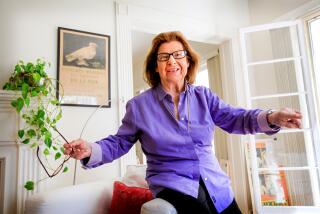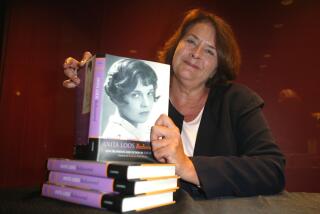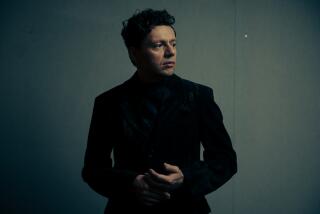Charles Higham dies at 81; controversial celebrity biographer
Charles Higham, a poet, critic and prolific celebrity biographer who found political and sexual intrigue in the lives of Hollywood icons such as Cary Grant, Marlene Dietrich and, most controversially, Errol Flynn, died April 21 at his Los Angeles home. He was 81.
The cause was apparently a heart attack, according to Todd McCarthy, a close friend.
Higham was the author of two dozen biographies, many of which were so salacious that a book critic reviewing “Howard Hughes: The Secret Life” in 1993 quipped that the writer had “reached the point where most of his subjects have slept with one another.” By Higham’s reckoning, Hughes was a bisexual who had affairs with Grant and at least two other Higham subjects, Bette Davis and Katharine Hepburn.
His most sensational work was “Errol Flynn: The Untold Story” (1980), in which he alleged the swashbuckling matinee idol was a Nazi spy. Higham claimed he had extensive documentation, including hundreds of government papers, but the book was denounced by Flynn’s former wife, colleagues and other biographers.
Higham considered his most important works to be “Trading With the Enemy” (1983) and “American Swastika” (1985), which examined collusion between the Third Reich and prominent Americans during World War II.
He said he based his allegations of Flynn’s Nazi ties on more than 5,000 U.S. government documents, including State Department memos, passport applications and Coast Guard reports. Among his claims was that the actor persuaded Warner Bros. to shoot scenes for the 1941 movie “Dive Bomber” at Pearl Harbor and a San Diego Navy base and then arranged for the Japanese government to view the footage in advance of its fateful attack on the U.S.
Flynn’s ex-wife Nora Eddington Black, who was married to him during World War II, wrote in a 1980 letter to The Times that Higham “hasn’t come up with a single document about Errol’s supposed tie-in with the Gestapo.” Another vociferous critic was William Donati, who co-wrote a 1989 book with Flynn’s stuntman and buddy, Buster Wiles, called “My Days With Errol Flynn.” Donati wrote a chapter that accused Higham of altering government documents to buttress his charges against Flynn, who died of a heart attack in 1959.
Higham stood by his book, telling the New York Times: “I don’t have a document that says A, B, C, D, E, Errol Flynn was a Nazi agent. But I have pieced together a mosaic that proves that he is.”
Born in London on Feb. 18, 1931, Higham spent his earliest years surrounded by servants as the son of a wealthy advertising executive. But, according to his 2009 memoir, “In and Out of Hollywood,” his childhood was unstable: His mother abandoned the family when he was 3, his father died when he was 7, and his stepmother sexually abused him. He eventually returned to live with his mother, who had remarried, but felt unloved.
He spurned college to work in a bookstore and began to write poetry, publishing two volumes by age 22. In the early 1950s he moved to Australia, where his first and only marriage ended: He acknowledged his attraction to men, and his wife fell in love with a woman.
Higham, whose longtime companion, Richard Palafox, died two years ago, has no immediate survivors.
In Australia, he began to write about celebrities for a Sydney newspaper, which sent him on assignments to Hollywood. He was researching a book on director Orson Welles when he accepted a teaching position at UC Santa Cruz in 1969. Soon after, he moved to Los Angeles and became a Hollywood correspondent for the New York Times.
In 1970, University of California Press published his first biography, “The Films of Orson Welles,” in which he theorized that the legendary director with a history of abandoned film projects suffered from a “genuine fear of completion.” The book was attacked in the New York Times by director and film historian Peter Bogdanovich, who said Higham’s book was so full of inaccuracies and unsupported conclusions that it amounted to “an illustrated textbook on how to criminally impair an artist’s career.”
In the Los Angeles Times, critic Charles Champlin wrote that although Higham’s scholarship was impressive, the result was an “engrossing, outspoken but I dare say not yet definitive book.”
Over the next four decades Higham poured out Hollywood biographies at a rapid clip: Florenz Ziegfeld, Cecil B. DeMille, Ava Gardner, Charles Laughton, Olivia de Havilland and Lucille Ball were among his subjects. His biography of Hughes formed the basis of the 2004 movie “The Aviator,” which starred Leonardo DiCaprio as the eccentric aviation magnate and movie producer.
The poet who became a king of the splashy Hollywood bio was dismissive of American critics who considered his books celebrity gossip. “In Europe there is no snobbery regarding books about film and theater at all,” Higham told Newsday in 1989, when he portrayed Grant as a wife-beating, miserly, closeted homosexual. “There is no problem in Europe at all of a literary writer turning to something quite different.”
More to Read
The biggest entertainment stories
Get our big stories about Hollywood, film, television, music, arts, culture and more right in your inbox as soon as they publish.
You may occasionally receive promotional content from the Los Angeles Times.







